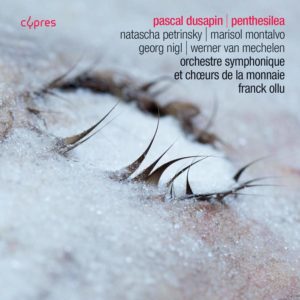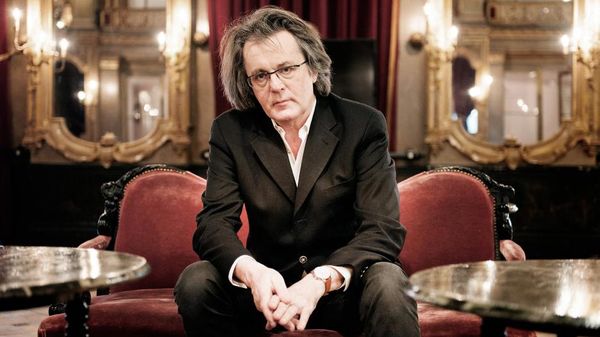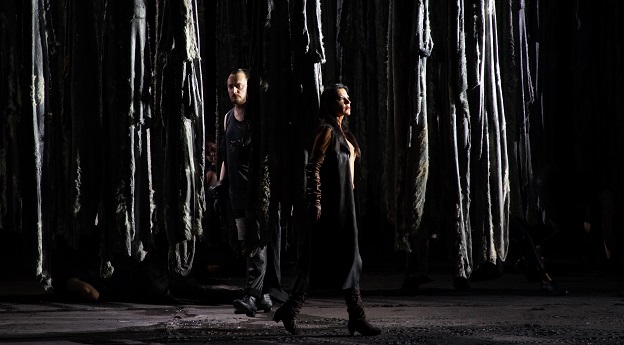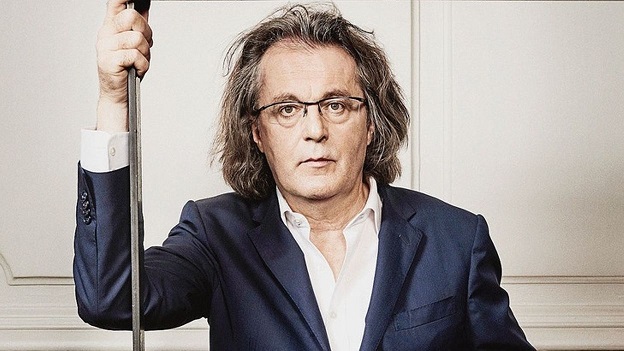Your opera Penthesilea has been unanimously acclaimed, notably at the last ICMA and the Belgian Caecilia Awards. It is considered by some to be the most accomplished and powerful opera you have composed so far. The music is so strong that it can perfectly do without the image. To what do you attribute the success of this work?
I’m obviously very happy with the success of this opera. By a happy combination of circumstances, the Penthesilea disc was released just as I was rehearsing my latest opera, Macbeth Underworld, which was staged here at La Monnaie a few months ago. I was immersed in Macbeth every day, and one evening I listened to Penthesilea in the apartment where I lived, in the centre of Brussels. I realised how different the two scores were! It’s true that my operas are not very similar. I believe that they deal with something very particular in dramatic and lyrical terms, thus appealing to different areas of the listening experience. But, to come back to your question, I don’t really know what the success of Penthesilea is all about. I think one of the reasons is that this opera has already been ‘assimilated’: people don’t discover it, they rediscover it. The recording has been widely circulated and I have had a lot of very positive feedback. I’m very happy because the Philharmonie de Paris will perform Penthesilea in a concert version twice next year. This will be an opportunity to check whether the music can actually work without the staging – even though I was very satisfied with Pierre Audi’s staging.
Having said that, I don’t think I’ll ever compose anything like Penthesilea again. When one lives, as a composer, a story such as this one, one goes very far in the expression of the psyche. You touch areas of the human psyche that are very heavy to carry. Personally, I always compose at my desk, very concentrated. It is a very interior work. Everything that singers experience on stage, I have experienced it before. Obviously, unlike the heroine of the myth, I haven’t murdered anyone [laughs]. But I really lived at the heart of the drama. And Penthesilea is probably a peak in the horror.
Your music is generally recognizable by its clarity, the transparency of the musical lines, combined with an instrumental palette of highly contrasting colours. You hardly ever use orchestral tutti to translate the violence that is expressed in the libretto.
Indeed. When I started Penthesilea, I wondered how to express suffering in its paroxysmal dimension, but without making the voices or the orchestra scream. The clarity of the affects is very important to me. When I wrote Medeamaterial, in 1991-1992, I was much younger than I am today… And even then, a German critic had already noticed that when it came to the murder of children, I was far from using all the means at my disposal. This critic had been very virulent, but I thought that deep down, he or she had understood my intentions perfectly well! It is a constant characteristic in my work: when the pain becomes maximum, I reduce the means.
When I started working on this score a little less than a decade ago, I saw my wife humming songs to my ten-year-old son, Anton, and I noticed that each time, our child became calm and was truly immersed in his mother’s body. He reacted in the same way when I sang something to him (although I’m not as good a singer as Florence…). And then I said to myself: ‘That’s it! When you suffer, what you want is to become like a child again.’ Who has never experienced this sensation of returning to the original body, even as an adult? It was obvious to me: to begin Penthesilea, I needed a pure song. I worked very hard to achieve this simplicity. It took me a year and a half to sketch out this song – of course, I had other things on the job at the same time, but before I really started working on the piece, I put all my energy into this song. This little melody haunted me. In the process, it went through many different versions until it became a theme, ‘the’ leading theme of Penthesilea. Throughout the opera, this fifth interval is immediately remembered with each new listening. When Penthesilea is at the height of her fear, of her own pain, this fifth interval reappears and refocuses her pain on herself.
 Penthesilea has an electroacoustic part that blends into the instrumental texture. Do you think electronic music itself still has a future?
Penthesilea has an electroacoustic part that blends into the instrumental texture. Do you think electronic music itself still has a future?
Electronic music has a very special future today. Many artists, who do not come from the world of classical music, are very interested in it. Fascinating genres are unfolding. I learn a lot about this music and listen to it too. But, to come back more modestly to my case, my point of view concerning electronic music is extremely pragmatic. Since Perelà, I’ve been using electronics quite a lot (I used it in Passion as well). But I only use it as a theatrical tool. The use I make of it responds to expressive, operatic and lyrical imperatives. I don’t have very sophisticated theories about electronic music; on the other hand, I want it to be perfectly integrated into the orchestral texture. For example, in Penthesilea – and this was already clear in Passion – there is no fundamental distinction between electronics and orchestral material. I don’t have any didactic notions about the alliance between the orchestra and electronics: whether instrumental or electronic, the music comes to me in the same momentum, even if I don’t master the electronic technique as well as the instrumental music – I need someone to help me. I make rather poor models and then work with Thierry Coduys who is really a wonderful collaborator in this field and knows me very well. He suggests subjects, we discuss them and we model the sound together. We spend hours working on it and thus manage to get this very particular sound which is always very integrated into the orchestra.
So it’s not tomorrow the day before you will deliver an electroacoustic work…?
I don’t think so, no. I’ve never thought about it. But, deep down, who knows? In 2008, I did an installation for the Nuit des Musées at the Grand Palais in Paris that was purely electronic. But it was a special event, with speakers as big as trucks. That’s something we’ll never be able to do again.
At the presentation of the Caecilia 2019 Awards, you made very warm comments about Belgium – and in particular about La Monnaie, which you believe is nothing less than your ‘opera house at heart’ …
That’s exactly how I look at La Monnaie. It’s the only opera house – and I’m usually lucky with opera – that has devoted seven or eight productions to me, including three world premieres: Medeamaterial, Penthesilea and Macbeth Underworld, under Bernard Foccroulle and Peter de Caluwe respectively; and Passion, O Mensch! and To Be Sung, as well as a new Medea, were also staged in Brussels. It is therefore no exaggeration to speak of fidelity. Besides, I’ve always felt very comfortable at La Monnaie. In fact, Belgium has always been very generous towards me since my early youth; my works are regularly performed in concert. One of my great orchestral and choral scores, Melancholia, was also premiered by the Orchestre de la Monnaie. Added to all this is the friendliness of the Belgian public and performers. It’s very special. The people I’ve worked with here have always been very kind to me and to my work. My relationship with them has always been quite gentle and very professional. I say this without any demagoguery or flattery.
In the production of your operas, what is your relationship with the directors? Do you give them carte blanche, or do you impose limits on them, or do you check that your intentions are respected?
I’ve had wonderful relationships with some directors, and some absolutely disastrous ones. I don’t want a director to displace the meaning of what I have imagined – and this has happened to me many times. We can do it with La Traviata, because everyone knows La Traviata. So I have no problem with directors who reshape a classical opera in favour of a more modern vision. I can very well understand such an approach. But in the case of a musical creation, I think it is essential that the director listens to the composer, because the creator is first and foremost the composer, not the director. One of the fundamental problems with some directors today is that they are frustrated that they are not really creators. So they live on the backs of others by moving objects: they ‘redefine’. This brings along these interventions, these seizures of power over the musical work itself, in the name of a vision that is supposedly ‘the’ ideal vision. Well, certain visions might be very interesting, I don’t have a very firm view on this. But, as far as I am concerned, I know very clearly when I have been happy with a director and when I have been disappointed. In the context of a creation, it is very difficult for a director to have a precise vision of the work to be produced. Especially in my case, because I only deliver a score; I don’t give sound models or anything else. But you have to create a dialogue with the director. That was the case with Thomas Jolly in Macbeth: we exchanged a lot of ideas over three years. Even though he didn’t know the music, he had a perception of it, and that made the production and the relationship I had with him extremely gentle. Pierre Audi’s work on Penthesilea was a little more amazing: it was the second opera of mine that Pierre staged; and both times he didn’t ask me anything! He had told me a very nice thing about Passion in Amsterdam: at the pre-general, I was a bit worried. I told him that I was surprised that he had never phoned me. He replied: « But why should I? You wrote it all down! Everything is clear in your score! « Pierre is no more a musician than Thomas, but he has a deep understanding of music, a kind of almost animal intuition with sounds. And this was evident in his staging of Penthesilea.
Writing an opera, you say, « allows me to convey a concern to the world. »
That’s right. My operas never really tell a story. I’m not interested in telling the story of someone who gets this or that and reacts this way or that way. I think that, in terms of narrative, cinema, and even theatre, are incomparable. For me opera is allusion to the world, I am interested in its reflective character. For me, it is the sound of the human psyche. I composed Medeamaterial in 1990, at the age of 35. When I premiered the work at La Monnaie, I remember that I was only talking about the Bosnian War. Time goes by, the context is constantly changing, but Medeamaterial retains its metaphorical power forever. Medeamaterial (which I have, in the meantime, renamed Medea) is now almost thirty years old; it has been staged many times, and I have seen many directors reappropriate the myth from their own history or from current events. Thirty years ago, Medea spoke of Bosnia, today it speaks of Syria, and between Syria and Bosnia there are hundreds of examples that can perfectly well find an allegorical anchor in this piece. The myth of Penthesilea certainly tells a story of love, but it is also a story of laws. In this sense, my Penthesilea is intimately linked to Macbeth: while the characters in Macbeth have no interest in the legal order – in a sense, they are practically all outlaws – Penthesilea respects the law of women to the letter and she ends up understanding that she can no longer live under its yoke. Stories like that, you only have to open the newspaper to find them in large quantities! They are extraordinary metaphors of today’s world. So why should I look elsewhere than in myths for the subjects of my operas? In our time, a bevy of politicians, and even ‘collective bodies’, entire societies, embody Macbeth, for example…
In your book Une musique en train de se faire, you write: « Some music is better than others: I prefer music that does not reassure, that displaces, disturbs and diverts our comfort. Some music will always bleed more than others ». It’s quite violent, all the same…
It’s funny that you quote this passage: I just spent two wonderful days in Strasbourg where I gave masterclasses. During a symposium, which gave me the opportunity to meet young composers, one of them told me: « There is a lot of haemoglobin in your music; it bleeds a lot! » Music is a thought. And the thing about a thought is that it has to make you think. And how, where do you think? What do you think? And how do you move that thought, which is life itself? Life must be articulated around thought. All the questions that concern existence, the path that is given to us, must be governed by thought. What we teach our children if we raise them well, if we try to instil something in them, is precisely to think, to move constantly and to resist that which prevents us from evolving, from reflecting, from building our life positively. So art has an absolutely essential function for me, not only because I have devoted my whole life to it, but also because of its self-reflexive capacity: it constantly questions. For example, a few days ago, in Paris, I bought a new complete set of Beethoven’s quartets, of which I’m a fanatic. I have a very good sound system in my studio, with two-metre loudspeakers that are more real than life. The music was so powerful, bleeding, that I cut it short. I said to myself: « Stop, or you’ll start crying! » I was overwhelmed by the music; not only by the interpretation, which is certainly very beautiful, but above all by the music itself, which I know by heart. I said to myself: « This is music that looks at me and warns me: ‘Watch out! If you think it’s simple…’ « . It’s a music that forces me to become more dignified. I’m not Beethoven, but I still want this: that my own music builds tectonic shifts in people. I don’t want to reassure them by telling them what they already know. Don’t get me wrong: I love my listener! Really, he is very important to me; without him, I would be nothing. But I want to whisper in his ear: « This is my worry. It’s true that what I think is not very funny, but let’s think together, follow me where I want to take you and let’s try to build the world we both dream of. » All this creates vigilance, awareness. I’ve said it many times, but I can only repeat it.
Opera is still struggling to get rid of certain labels; it is claimed to be an elite art form. Yet opera houses around the world are making incredible efforts on the audience. And I particularly like La Monnaie because its audience is very different from the Parisian public; it’s not the same social perception at all. But, despite the clichés that stick to it, opera is this multifaceted and hybrid form that allows us to worry about the world.
You were talking about Beethoven. He said: « What is hard is also good, great and magnificent ».
That’s for sure. Taking the listener out of his comfort zone is also what Beethoven did. In his later quartets, for example.
You also wrote: « Listening leads us to the gates of an infinitely subtle world: the world of emotions. Let us have no mistrust of that word. Emotion is a mental condition from which no one can escape. What we receive from music is an emotion. » So you are not hostile to contemporary hedonistic music as such, but to the music that boggles the listener down in his or her listening habits?
Yes, I am. I have no suspicion of emotions. I often say that art consists in inventing new ones. I add that those who deny this are hypocrites. But what emotions are we talking about? It’s about creating desire, joy; but joy that questions. The idea is to create awakening. This is also the hallmark of philosophy, which for this reason I often associate with musical exercise. In all the aesthetic debates – most often idiotic – that take place in the cenacles of contemporary music, the neo-tonalists try to summon archetypal figures who proved their worth a long time ago. And they cling to them almost desperately. At the same time, they carry with them a lot of cultural reflexes, rather than appropriating a truly new world. At the other end of the spectrum, some amateur composers of great contemporary radicalism throw themselves into the same debates. For them, I am Claude François! They do not accept to let go themselves and also claim to be part of an academic tradition, which is that of the avant-garde, that of the post-war period, with its codes, its systems of recognition, its hierarchical and societal principles. There is a form of bourgeoisie in all these controversies. The partisans of these two extremisms, I willingly put them back to back.



























